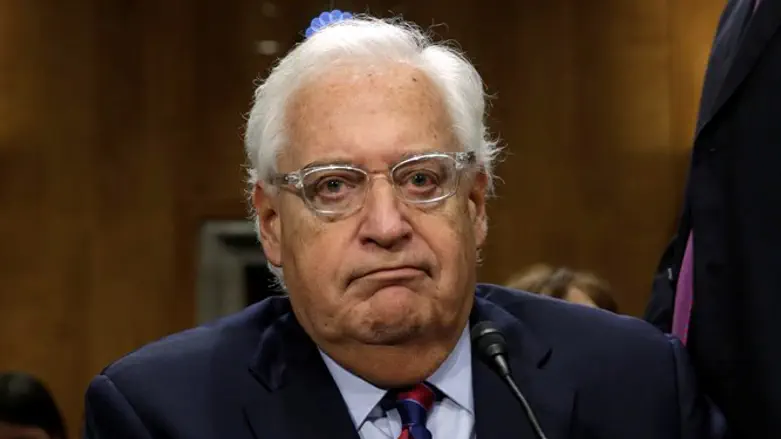
US Ambassador to Israel David Friedman in an interview with Hebrew-language newspaper Israel Hayom said US President Donald Trump will arrive next week in Israel "with no specific plan or road map in mind" and that "there are no demands for Israel to freeze building in Judea and Samaria."
According to Friedman, "The President clearly explained what he wants to see happen in the beginning, which is that both sides should sit down at the same table with no preconditions, and talk. Hopefully, this will lead to peace."
"The US will not dictate how you need to live together here. That's something that only you will decide.
"There is no doubt that former US President Barack Obama's policies have come to an end. There will be a dramatic change. The entire region suffered, because the US did not lead. The President is trying to fix that.
"I don't want to speak in his name about what he will or won't do regarding the building in Jerusalem, Judea, and Samaria, but if we look at what he's said about the settlements until now, we see that his attitude is completely different than Obama's.
"Trump didn't say settlements are an obstacle to peace. He didn't say he wants a freeze. He said he wants to come to an understanding with the Israeli government on how the issue will be dealt with.
"I think it's very different."
"The President is aware of the fact that the Israeli government needs to find an alternative place for Amona's residents," Friedman continued. "In the excerpt of his conversation with Palestinian Authority Chairman Mahmoud Abbas, I didn't see any mention of the settlements."
"In 2009, Hillary Clinton insisted on a complete freeze of all building in Judea and Samaria, but Abbas still refused to come to the negotiating table. Now, we don't have any demands that Israel freeze building, and Abbas is interested in meeting Israeli Prime Minister Binyamin Netanyahu without any preconditions.
"I don't know if Israel will ever have to make concessions. It's hard to answer that question right now.
"I believe both sides - not the US president - need to want to come to an agreement. We can only help. The decisions need to be made by the two sides.
"We will not force anyone to do what he does not want to do, or demand he adopt a specific approach. President Trump is good at handling negotiations, and I believe he will be able to help both sides reach an agreement that they will be happy with. And unlike his predecessors, Trump places an emphasis on the practical, not the theoretical.
"He may not be able to work magic, but he definitely can lead both sides to finding a common denominator, at least initially."